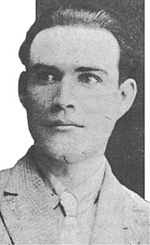
Alfonso Cortés
Encyclopedia

Nicaraguan
Nicaraguans are people inhabiting in, originating or having significant heritage from Nicaragua. Most Nicaraguans live in Nicaragua, although there is also a significant Nicaraguan diaspora, particularly in Costa Rica and the United States with smaller communities in other countries around the world...
poet
Poet
A poet is a person who writes poetry. A poet's work can be literal, meaning that his work is derived from a specific event, or metaphorical, meaning that his work can take on many meanings and forms. Poets have existed since antiquity, in nearly all languages, and have produced works that vary...
. He is often referred to as the most important poet after Rubén Darío
Rubén Darío
Félix Rubén García Sarmiento , known as Rubén Darío, was a Nicaraguan poet who initiated the Spanish-American literary movement known as modernismo that flourished at the end of the 19th century...
. Before his death, he often said he was "less important than Darío, but more profound".
Early life
Cortés was born in the colonial city of LeónLeón, Nicaragua
León is a department in northwestern Nicaragua . It is also the second largest city in Nicaragua, after Managua. It was founded by the Spaniards as Santiago de los Caballeros de León and rivals Granada, Nicaragua, in the number of historic Spanish colonial homes and churches...
, Nicaragua
Nicaragua
Nicaragua is the largest country in the Central American American isthmus, bordered by Honduras to the north and Costa Rica to the south. The country is situated between 11 and 14 degrees north of the Equator in the Northern Hemisphere, which places it entirely within the tropics. The Pacific Ocean...
. At the age of 34, he moved into the house in which the famous and most celebrated Nicaraguan poet, Rubén Darío
Rubén Darío
Félix Rubén García Sarmiento , known as Rubén Darío, was a Nicaraguan poet who initiated the Spanish-American literary movement known as modernismo that flourished at the end of the 19th century...
, spent his childhood. Cortés lost his mind on midnight of February 18, 1927 at the age of 34. Cortés spent much of that year chained to the iron grillwork of his bedroom window as a result of his delirium
Delirium
Delirium or acute confusional state is a common and severe neuropsychiatric syndrome with core features of acute onset and fluctuating course, attentional deficits and generalized severe disorganization of behavior...
growing violent. The next 25 years of Cortés life was spent in a mental hospital
Mental Hospital
Mental hospital may refer to:*Psychiatric hospital*hospital in Nepal named Mental Hospital...
in Managua
Managua
Managua is the capital city of Nicaragua as well as the department and municipality by the same name. It is the largest city in Nicaragua in terms of population and geographic size. Located on the southwestern shore of Lake Xolotlán or Lake Managua, the city was declared the national capital in...
. Growing older and nearly at the end of his life Cortés was transferred to his sisters house in León where he eventually spent his last days and died in 1969 at the age of 66.
Cortés had his moments of lucidity
Lucidity
Lucidity may refer to:*In common usage, intelligibility, brightness or sanity*Awareness of the dream stage; see Lucid dreaming*Lucidity , a 2006 album by Delain...
in which his family would unchain him and he would use that time to play guitar and write his poetry which he often wrote down in the margins of newspapers in a script so microscopic that they are hard to read without a magnifying glass. Song of Space was the first poem Cortés wrote after he went mad and it remains one of his most popular.
After his death he was buried in the Cathedral of León next to the tomb of Rubén Darío.
Poems
- La odisea del Istmo (1922)
- Poesías (1931)
- Tardes de oro (1934)
- Poemas eleusinos (1935)
- Las siete antorchas del sol (1952)
- 30 poemas de Alfonso (1952)
- Las rimas universales (1964)
- Las coplas del pueblo (1965)
- Las pumas del pasatiempo (1967)
- El poema cotidiano (1967)
- Treinta poemas (1968)
- Poemas (1971)
- Antología (1980)
- 30 poemas de Alfonso (1981)
- El tiempo es hambre y el espacio es frío (1981).
External links
- Alfonso Cortés at nicaragua.com (in English)
- Alfonso Cortés at the Archive León Museum (in Spanish)

